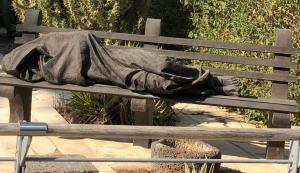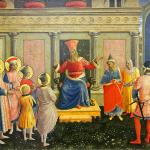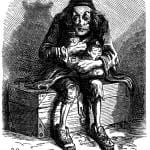
A few minutes after a statue a statue of Jesus, depicted as a homeless man sleeping man on a park bench, was installed, police in Cleveland received a phone call telling them what they saw: a homeless man sleeping on a bench in a rather wealthy side of town. When the police arrived on the scene, they realized that what someone thought was a homeless man was actually a statue. The statue represents in a visual form what Jesus had told his disciples: that he was one with the poor and needy, and what is done to them, is done to him (cf. Matt. 25:31-46). Or, as Paul said, Jesus came to us by becoming poor: “For you know the grace of our Lord Jesus Christ, that though he was rich, yet for your sake he became poor, so that by his poverty you might become rich” (2Cor. 8:9 RSV). There can be no better representation of this fact than the reaction given to the statue. What was done for a potential homeless man was done to Jesus. But, it must be made clear, it does not seem that the call was made out of malice: rather, it seems that the caller was concerned, thinking they might have seen someone in extreme need of help, and they hoped that the police would know what to do. The anonymous caller was concerned about the welfare of the person they thought they saw on the bench. By attempting to look after a man who might have been in need, they sought to help Jesus himself.
If we want to show our love for Jesus, Jesus told us what to do. He made it clear. We are to be concerned about the poor. Not only should we do what we can when we come upon those in need, we should be so concerned about those in need, we will find out what has caused them to be in such need and try to fix the situation for them. For, if we truly care about the poor, we will care about changing the system which made them poor. The two go hand in hand.
If we truly care for Jesus, we would care for his presence in the poor; and if we care for his presence in the poor, we will care for the poor. When we discern what has made them poor, what has forced them into poverty, that is, when we see the structures of sin behind their predicament, we will do what we can to fix the situation. We will try to overturn those sinful structures. We will work to put up social safety nets so that people in need will have a way to have their needs met. However, if we don’t really care about those in need, we might still give them some charity, some alms from our excess, not because we are concerned about their well-being, but rather, we are concerned about what others think of us. We will not be concerned about fixing the situation, but rather, making sure the structures of sin remain in place so we can continue to act as if we were great philanthropists whenever we gave a few alms to some needy person. Though it might look charitable, since it is not of the heart, it is far from true caritas – if we give millions because we have made billions off of the backs of the poor and needy, we remain reprehensible. Jesus will not be fooled; he has already told us he will not look favorable to such false charity: “Woe to you, when all men speak well of you, for so their fathers did to the false prophets” (Lk. 6: 26 RSV).
We must be concerned about the poor. We must, like Jesus, find ourselves in solidarity with them, seeking to work on their behalf, doing what we can to change the system which has caused them harm. We must, as Henri de Lubac explained, look after the poor beyond all ideologies:
When we choose the poor, we can always be sure of not going wrong. When we choose an ideology, we can never be sure of not being at least partly wrong.
When we have complied with an ideology, we can never be sure of having taken the right course. When we choose the poor, we are always sure, doubly sure, of having made a good choice. We have chosen like Jesus. And we have chosen Jesus. [1]
Do we choose Jesus, or do we choose ideology? Do we work to promote Jesus and his cause, or do we work to promote structures of sin which undermine his work? Jesus gave his blessings to the poor and needy, even has he gave harsh warnings to the rich. Do we take Jesus seriously? Or do we think we can ignore him when he says, “But woe to you that are rich, for you have received your consolation. Woe to you that are full now, for you shall hunger. Woe to you that laugh now, for you shall mourn and weep” (Lk. 6:24-25 RSV)? Jesus told the poor that the kingdom of God will transform the world, and then the world will be theirs.
Have we paid attention? Do we fight against Jesus in support of the rich and powerful, promoting those ideologies which stand in stark contrast to Jesus, or do we take seriously his words about wealth and poverty? Do we think we can ignore his stand with the poor if we speak out against sexual vices? James warns us against such a train of thought as he tells us we must first be concerned with our neighbor and their welfare:
If you really fulfil the royal law, according to the scripture, “You shall love your neighbor as yourself,” you do well. But if you show partiality, you commit sin, and are convicted by the law as transgressors (Jas. 2:8-9 RSV).
Every time we find an excuse to ignore the plight of the oppressed, every time we find an ideology which we hold onto instead of the teachings of Christ, we find ourselves fighting against Christ himself. Do we understand what can be learned from what happened with the statue of the homeless Jesus? Do we not see how Christ identified himself with the homeless, and so we, too, should look at them and treat them with the respect we would show Christ himself? If we find any excuse to neglect them, if we try to justify oppression by saying the victims did it to themselves, we stand with those who mocked Christ on his way to his crucifixion.
Will we choose ideology or Jesus? Will we ignore the poor for the sake of ideology, or will we finally realize Jesus meant what he said and look for him among the poor and help them by changing the system which oppresses them? Will we stand with Jesus, or will we stand with the rich and powerful who game the system to oppress the poor and needy?
[1] Henri de Lubac, Paradoxes of Faith. Trans. Paul Simon, Sadie Kreilkamp and Ernest Beaumont (San Francisco: Ignatius Press, 1987), 135.
Stay in touch! Like A Little Bit of Nothing on Facebook.
If you liked what you read, please consider sharing it with your friends and family!













